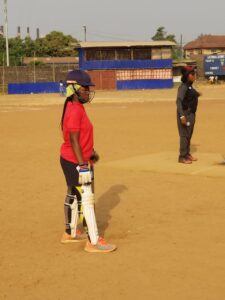A small crowd of fans, players and officials gathered at the Kingtom Oval, Freetown’s main cricket pitch, for the Women’s T20 Elite franchise League that has seen an amazing display of talent and professionalism since it started on January 27, 2023. Among the players who have come here to help their teams compete in the top tournament in the women’s category is 17-year-old Alice Fillie. Arriving with a huge backpack containing her kit, Alice was scheduled to play later with Team Glena Thompsom, who would feature in one of the late fixtures against Team Grace Jenner Wright. Alice arrived quite early to watch the first set of games while preparing for theirs.
As the women’s teams battled it out on the oval, young, aspiring cricket players were honouring a training session in a small area of the dusty pitch that is certainly not in the best of conditions. No day off for them. Alice used to be in that category, but has since been promoted to the Under-19 team and also playing with the senior women’s team, representing Sierra Leone on the international stage in various tournaments.
Young Alice developed an interest in cricket in 2021 when she started following her cricket-playing extended family members to training and matches. Witnessing the training and enjoying the matches, the 13-year-old Alice realised it was a sport she could play.
“I quickly started attending training sessions, and due to my outstanding performance, I was inducted into the Under-19 team,” she told Engage Salone.
One year later, Alice made her first professional appearance, representing Sierra Leone in the ICC Under-19 World Cup qualifiers in Botswana. Her continued brilliance earned her a place in the Sierra Leone team participating in the ICC T20 invitational series in Nigeria, bagging one player of the match award, the best bowler of the tournament and featuring among the tournament’s Most Valuable Players (MVPs).
The appearance that Alice says is dearest to her heart is her second trip to Botswana and the third for the ‘Ladies Patriot, ‘ as the Sierra Leone national female team is fondly called. She was part of the ICC T20 Women’s World Cup African Division Two qualifiers. Even though the team could not make it to the World Cup, she was proud of her performance. “Again, I did my best and walked home with one player of the match award”, she said with a broad smile.
Alice is studying for a Bachelor’s Degree at the University of Sierra Leone. Striking a balance between her programme and professional cricket has been quite challenging, but she is determined to do both, and she has been successful. Alice’s family supports her, but not without reservations, especially in her early days.
“My family supports me, but they think cricket can’t take me anywhere. My mother gets mad when the game comes between me and my house chores. At some point, I almost quit because I felt I could not handle some positions of my family members, especially those who felt that playing cricket would make me look like a man.”
Through constant negotiation and multi-tasking, Alice found her way around the issues with family members. “I had to learn to multitask to make time for everything that I have to do,” she said, adding that she was grateful to her mother, friends and coaches for guiding her. The gains she has made in cricket also help convince Alice’s mother and other family members that there is a prospect. But as she tells her story beside the pitch where Team Kadijah Fofana and Team Christiana Johnson had engaged in a dust-raising showdown, reminding Alice that the promise of glory and a better life through cricket is a very long shot.
Pointing at the dust that covers the pitch, which makes playing extremely hard, Alice bemoans the state of the city’s main cricket field. “Diving for a ball in such a condition is practically impossible,” she said.
“For those of us who have had an opportunity to play outside Sierra Leone, we can confirm that the lack of good facilities is one of the reasons we haven’t made it very far in international competitions.”

For a sport that has brought honour to the country under very difficult circumstances, the neglect is palpable. Officials and fans of the game have always cried out for the attention of the country’s sporting authorities, making the case that cricket has much to offer if it is supported. According to an old supporter of the game, cricket could well be Sierra Leone’s saviour sport, a sentiment that Alice and the Chairman of the Board of the Sierra Leone Cricket Association (SLCA), Francis Trevor Samura, agree with.
The Cricket Association boss confidently said, “if you are looking for performance, I think cricket will be at the top in terms of sports in Sierra Leone. We have a very good record when it comes to performance.”
From 2008 to date, Sierra Leone’s cricket teams have won over 30 trophies–gold, silver, and bronze. Cricket officials believe this is one of the highest number of honours by a single sporting discipline in Sierra Leone, if not the highest. Chairman Samura argues that “if the sport gets the required structures, facilities, and personnel, they can perform better than they have been doing”.
Cricket has endured in Sierra Leone largely due to the passion of its players and supporters and the goodwill of its supporters, who have also found ways to keep the game playing even in difficult circumstances. Chairman Samura said they did not experience situations where people abandon the sport because of a lack of resources. They have been fortunate to have coaches who offer their services voluntarily because of the love of the game.
Another cricket official and the Chief Executive of the association in Sierra Leone, Alim Cawray, reinforced this point. He says cricket is one of the sports that has survived in Sierra Leone without government subvention and is doing very well.
“Our ladies went to the Gambia in 2014 to participate in the maiden edition of the North-West Africa Cricket Council (NWACC) tournament. They won gold and defended this title in the tournament’s equivalent in 2015,” he told Engage Salone.
“Last year alone, they [Sierra Leone’s cricket teams] participated in six international tournaments, including the Nigeria T20 international women’s invitational tournament in Lagos, where they emerged with a bronze. After that, they participated in the ICC Under 19 Women’s Cricket World Cup African Division qualifiers in Tanzania and then the ICC T20 Women’s Cricket African Division II Qualifiers in Botswana. They further participated in the West African Men’s T20 Cricket Trophy in Nigeria and the African Cricket Association (ACA) Men’s T20 Continental Cup Qualifiers and proceeded to the finals”, says Samura.
The latest International Cricket Council ranking places the Sierra Leone Senior Women’s Team ninth in Africa and 39th globally, while the National Senior Men’s side is 12th in Africa and 67th globally.
Ibrahim Sorie Kamara is a Cricket Association coach. As a player, his team qualified for the 2009 U-19 World Cup but could not participate for various reasons, including a lack of funds and visa issues.
Kamara believes that investing in youth cricket will make a big difference. He made a case for revitalising school competitions, which he said helped recruit and train young talents in the past and produced many young players.
The cricket structures in Sierra Leone currently include six national representative sides. Five of them represent Sierra Leone at the international level– the senior men’s team, the senior women’s team, the junior women’s team (Under-19), the junior women’s team (Under-19) and the Under-17 boys team.
Chairman Samura told Engage Salone that these teams were being prepared yearly to represent Sierra Leone in international tournaments. The elite cricket franchise league that Alice is playing is the pathway to the Nigeria Women’s T20 cricket invitational tournament scheduled for February 25, 2024. He says the tournament will be followed by the men’s T20 Division I league, which ushers in the Premier League. After that, they will stage the Elite Cricket Franchise League for the men, which will lead to the ICC Men’s T20 Cricket World Cup Sub-regional qualifiers. The youth leagues will commence side by side for both men and women in preparation for the Men and Women’s World Cup qualifiers in the third quarter of this year. “All of the local tournaments are tied to international competitions”, he says.
Samura says that funding has been the biggest challenge for the sport. Until last year, when the government came in, the International Cricket Council funded cricket in Sierra Leone, whose support he describes as “consistent”. After a clamour last year, the government paid for flight tickets for 14 players and four officials to represent Sierra Leone in the T20 international women’s invitational tournament in Nigeria. The government’s support, according to Chairman Samura, is not enough. So, they are advocating for alternative sources of revenue for sports, including levies on road users and tax rebates for corporate institutions that support sports in the country.
With all the challenges, Alice sees herself staying in cricket and working harder for even higher heights. She dreams of doing well for herself, inspiring others, and becoming a model for young people.


